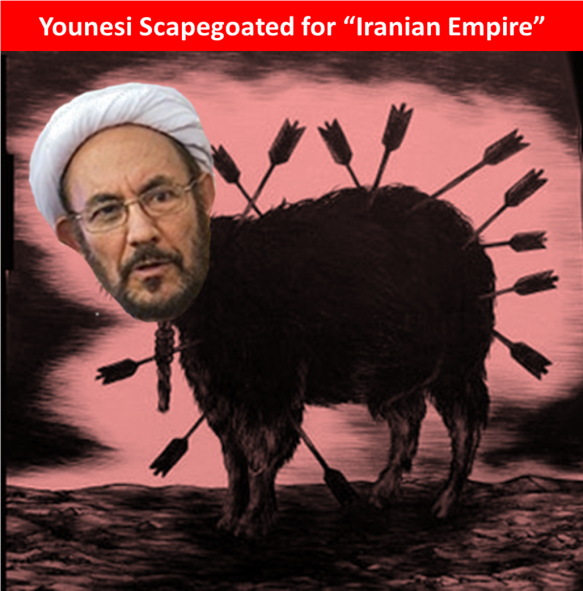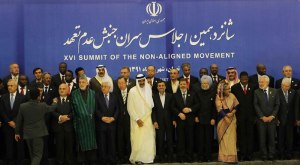
Supporters of Tehran like to repeat that Iran hasn’t initiated a war for hundreds of years (since 1798), idealizing Iran as a peaceful country, while pointing out the US is a country which has initiated numerous wars.
And although this makes statistical sense, it is profoundly misleading. Tehran’s modus operandi is not invasion but infiltration and subversion.
The proof lies in Iran’s military and political influence in Lebanon, Syria, Gaza, Iraq, Yemen and to a lesser extent (for now), in Afghanistan, Bahrain, UAE, Kuwait, Oman, Sudan, Egypt etc…
And proud of it too
 The Iranians are (justifiably) proud of the power they exert: Ali Akbar Velayati, a senior advisor to Iran’s Supreme Leader Ali Khamenei recently boasted that Iran’s influence spreads from Yemen to Lebanon adding that Iran’s “current power was unsurpassable for anyone in the world”.
The Iranians are (justifiably) proud of the power they exert: Ali Akbar Velayati, a senior advisor to Iran’s Supreme Leader Ali Khamenei recently boasted that Iran’s influence spreads from Yemen to Lebanon adding that Iran’s “current power was unsurpassable for anyone in the world”.
Iran’s military forces outside of its borders are masterminded and managed by one Qassam Suleimani, the chief of Iran’s elite Qods, a formerly shadowy master puppeteer who has finally stepped into the spotlight for doing what he stated already back in 2007: “you should know that I, Qassem Suleimani, control policy for Iran with respect to Iraq, Lebanon, Gaza, and Afghanistan“.
Since then, he has his own offices in Beirut, Damascus and Baghdad with key local representatives and is constantly on the move from battle to battle.
Suleimani enjoys the full support of Supreme Leader Khamenei who urged him to increase terror attacks against the West and its allies.
Lebanon (Hezbollah + Qods) & Gaza (Hamas)
 Iran’s ties with Lebanon and Gaza date back from the Islamic revolution and the wish to fight a mutual enemy – Israel.
Iran’s ties with Lebanon and Gaza date back from the Islamic revolution and the wish to fight a mutual enemy – Israel.
Formal ties escalated with the signing of a treaty in 2008 which guaranteed Lebanon military and financial support ($10 Billion in trade and $100-$150 Million to Hezbollah yearly). Since Hezbollah rose to power in Beirut, Iran’s political influence has increased to the point where the Lebanese government has openly requested for Iranian military aid on Lebanese soil. Tehran cordially agreed, Beirut reneged and then recapitulated under pressure from Hezbollah.
But is Iran welcome by the Lebanese people? A poll from 2012 shows that only 39% of the Lebanese view Iran favorably while 74% approved of tougher sanctions against Iran.
Likewise, Iran’s influence in Gaza dramatically increased following Hamas’s rise to power in the 2006 elections. Iran supplies Hamas with rockets/ammunition and funding to the tune of $30-$50 Million a year. On the whole, Iran’s influence is welcomed in Gaza by all Hamas supporters but Fatah leaders are ambivalent – they fear Tehran but they understand that without Iran, their cause would fizzle out. And although Hamas suffered a fall-out with Iran by choosing the “wrong side” in the Syrian civil war, relations are warming up to normal as a Hamas delegation recently was welcomed warmly in Tehran enjoying meetings on highest levels.
So did Iran invade Lebanon and Gaza? No.
Have they turned both of these states into satellite Shi’ite entities of Iran’s influence? Definitely yes.
Syria & Iraq (Hezbollah + Qods)
 Immediately following the breakout of the civil war in Syria, Iran sent “humanitarian aid” and warned the West not to get involved while doing exactly that – got involved: Iran financed Assad to the tune of approximately $10 Billion and placed its Hezbollah/Qods troops at his disposal, allowing Suleimani to echo Colonel Kurtz’s from Apocalypse Now: “The Syrian army is useless! Give me one brigade of the Basij, and I would conquer the whole country“. Regardless of Suleimani’s criticism of the Syrian army, Assad owes his power to Tehran and supports Iran politically and militarily without hesitation.
Immediately following the breakout of the civil war in Syria, Iran sent “humanitarian aid” and warned the West not to get involved while doing exactly that – got involved: Iran financed Assad to the tune of approximately $10 Billion and placed its Hezbollah/Qods troops at his disposal, allowing Suleimani to echo Colonel Kurtz’s from Apocalypse Now: “The Syrian army is useless! Give me one brigade of the Basij, and I would conquer the whole country“. Regardless of Suleimani’s criticism of the Syrian army, Assad owes his power to Tehran and supports Iran politically and militarily without hesitation.
Iran’s involvement in Iraq began with its support of the Shi’ite Prime Minister El-Maliki but it received a huge boost following ISIS’s rampage in Syria and Iraq. Hezbollah troops were immediately reassigned to deal with ISIS on Iraqi soil while Suleimani mobilized the Iranian army directly against ISIS on Iraqi soil.
Much like it does in all other regions with large Shi’ite populations, Tehran strengthens its high level military and political pressure with grassroots organizations and local militia.
And just as in Lebanon and Gaza, Baghdad placed formal requests to Tehran for military support offering Iran the chance to turn Iraq into a satellite state as well.
Foreign minister Zarif made Iran’s stance vis-à-vis Syria and Iraq very clear: he maintains support for both while urging the West to stay out.
So, did Iran invade Syria and Iraq? Again, no…not literally.
Has Tehran turned Syria and Iraq into satellite states? Syria, definitely yes. Iraq? On the way.
Yemen and the Gulf States
 Unlike Lebanon, Gaza, Syria and Iraq, Iran’s influence in some states is still in its infancy.
Unlike Lebanon, Gaza, Syria and Iraq, Iran’s influence in some states is still in its infancy.
Two months ago, Iran backed a mini-revolution in Yemen and managed to wrestle Yemen out of the Saudi hands. This event followed half a year of tense relations between Iran and Yemen regarding a kidnapped Iranian diplomat and repeated efforts by Tehran to mobilize Shi’ite supported Hoothi troops. These efforts were finally successful.
Meanwhile, Tehran continues to try to infiltrate its Gulf neighbors by operating spy rings and subversive organizations in Bahrain, Kuwait, Oman and Saudi Arabia.
So, no, Iran doesn’t officially invade countries or initiate wars.
It’s smarter, cheaper and more effective to simply infiltrate countries through a volatile cocktail of money, military and religious support. Reminds us somewhat of the Roman peace – it also claimed that it only acted out of peaceful intentions, until they conquered most of Western hemisphere.

























